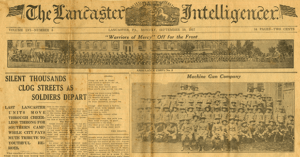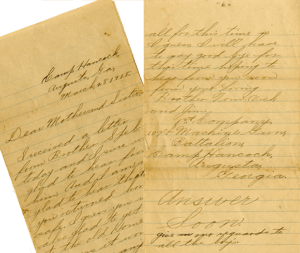The Kegel Chronicles, Part One
The first in a series of three articles
on the Kegel: World War I Papers of Thomas, James and Victor Kegel, 1917–2014
(MG-798)
Written by Elizabeth McIlhenney
 The Kegel Chronicles, Part One: Life at Training Camp
The Kegel Chronicles, Part One: Life at Training Camp
After the United States’ entrance into the First World War on April 6, 1917, many of the men in the nation either were drafted or enlisted in the war effort. The same applied to the sons of Lancaster County. Living in the archives at LancasterHistory are the WWI papers of Thomas, James, and Victor Kegel. The collection contains letters and other memorabilia from the three Kegel brothers’ journeys during the war, spanning from the time they entered the war and began training in 1917, to when they came home after the war ended in 1919.
The three Kegel Brothers, Thomas, James, and Victor, were amongst the hordes of Lancastrian young men who decided to enlist in the army. The Kegel Brothers became a part of the 1st Company of the 109th Machine Gun Battalion. Thomas, or Tom, as he signs each of his letters, wrote the most letters it seems, and describes his experiences the most in these letters.
The Kegel Brothers began their training as machine gunners in Camp Hancock in Augusta, Georgia. Or, as the brothers liked to call it, “Dixie Land.” The brothers often wrote about the environment in which they were training, writing about the weather and the scenery. One of the brothers’ favorite activities they often wrote about was hiking with their company through the countryside in Augusta, but they also wrote about playing football with their friends, and playing music with makeshift instruments such as mouth-organs and galvanized tubs. As one can imagine, a group of three brothers would presumably band together amongst all this change. In their letters, the brothers boasted about getting along better than when they were younger, “without trouble” as Tom writes.
However, life in the camp was not all fun and games. The Kegel brothers were put into intensive training, so that they could learn as much as possible in the short amount of time that they were in camp:
Mother we are out on a new job again we are drilling with mules we are having real machine gun drills now, I guess we will get target practice. Our rifle range almost finished so I guess we will have a week or two to practice we were supposed to go out to the rifle range today but it was raining almost all day and we didn’t go […] then after dinner it stopped raining and we went out to drill and we were also throwing dummy bombs […]
Along with the physical and intellectual strain placed on the recruits, they also had to deal emotionally with the changes to their young lives.
It is a possibility that the Kegel brothers even dealt with these emotions of loneliness and homesickness. After receiving a worried letter from his mother after her hearing from a family friend that Victor might be homesick, Tom writes in one letter “I don’t see how Vick could be homesick while Jim and I are here he seems just as happy as the rest of the boys.” While Tom may have been truthful about his brother’s alleged homesickness, he could have also been sparing his mother from worry. After all, Kegel brothers wrote in nearly every letter about something they missed about home, whether it be the hunting, the countryside, or just their mother’s home cooking. After all, what young man wouldn’t be homesick living nearly 700 miles away from their hometown and their mother’s home cooked meals?
Business and pleasure sometimes intermingled for the Kegel brothers and their company down in Augusta, Georgia. They wrote about their company marching in parades down in the South:
As this is Friday on Washington’s Birthday and we had to parade in town the whole 28th division was turned out there was about 30,000 troops in the parade and we hiked for about fourteen miles, it sure was some big turnout […]
Additionally, their company was invited to social events thrown for the soldiers’ entertainment, and Thomas writes one evening that, “Sacred Heart Church had a supper for us on Wednesday night and we got an invitation so we went and we had a good time.” Tom and Vick (since James was married) even mentioned a couple of times about the pretty “chickens” they were meeting while at camp, which is presumably referring to the young women in Augusta.
After all, the brothers were 19, 22, and 26 when they enlisted in the war. Their youthful dispositions shine through in each letter—especially when they write about their mother’s cooking. Like most young men, the Kegel brothers each loved to eat, and eat, and eat. The Kegel brothers’ mother and sister sent them a box with home-baked goodies, and they continued to rave about and request more of the goodies for nearly all the rest of the letters the Kegel brothers wrote while they were in training camp. According to their letters, the boxes would contain goodies such as their famous chocolate cake, candy, tobacco, and possibly even some hand-knitted items. The boys would share their goodies with their friends in their bunk, and would brag about how much their friends loved the homemade goods sent to them, and how much they loved to hear their names at mail call. Tom Kegel writes, in a letter to his mother and sister at home that, upon receiving one of their boxes:
[…] Everything was in the best of condition, most every day one or two of us boys in our tent gets a box and we sure have some great time[s] in the evening. I [ate] so much this evening that I had to stop and come up for air, I am getting such a belly on me… the Lieutenant has to tell me to stick my belly in so you can easily see the army life sure agrees with me and Victor is getting much stouter also.
They also talk about friends and family members who sent them things like handkerchiefs or postage stamps. The boys were all well taken care of by their loved ones, but they also sent goodies back home. They once wrote about sending a cactus home to their mother, and other small gifts and mementos.
 The most important theme amongst the Kegel letters chronicling their training camp experience is this youthful and hopeful outlook they had. They wrote about missing home, but enjoyed their surroundings while they could. They wrote of missing their family, grieving over being denied furlough to spend Christmas at home, but also of having fun and making new friends with the other recruits in the camp. Their sanguine attitudes carry through each letter, even when they eventually do travel overseas and fight in the trenches of France.
The most important theme amongst the Kegel letters chronicling their training camp experience is this youthful and hopeful outlook they had. They wrote about missing home, but enjoyed their surroundings while they could. They wrote of missing their family, grieving over being denied furlough to spend Christmas at home, but also of having fun and making new friends with the other recruits in the camp. Their sanguine attitudes carry through each letter, even when they eventually do travel overseas and fight in the trenches of France.
Below is an excerpt from a letter written by Tom, Vick, and Jim on March 28th, 1918 to their family back home in Lancaster City:
And this is now Wednesday afternoon and we don’t work I can easily take the pleasure to write a good letter, I have got a new overcoat and I look a little like somebody new, my old overcoat two of us used to get in and button it up so you can imagine how nice it fit me, well we have something on the people up North anyhow, we are still taking cold water baths down here the weather is fine, I guess up there the weather is pretty cool, we were on another small hike yesterday afternoon we only covered fifteen miles, but it sure is great to walk through the country I wish we could hike every day for that is the only life, you sure see some pretty places, there sure is no chance of coming home on Christmas because the way things look we may make a move almost anytime the captain told the boys he couldn’t give anybody a furlough so I guess we can’t get home, we were drilling pretty hard the last two weeks, but from noon I don’t think we will work very hard we are going to get lots of schooling on a new machine gun and signal work so we will have to study, but I would much sooner go to school than drill all day. I have got a letter from Brother Spebrie and he told me he was pretty busy I guess Dad is pretty busy by this time also, the only thing I miss down here is my good old gunning but I think next year we will be home to get some of it, the rabbits ain’t out down here yet it is a little too warm for them but I have saw lots of Patridges since we are here most every day we take a walk we see a bunch or two the sports down here don’t bother about rabbits at all, all they shoot is squirrels and birds this is the country that the boys aught to be in they could shoot all the game they wanted you see lots of bird dogs down here but very few rabbit hunters, how is father doing with business I guess he is getting along alright. Is Jim still helping him. Let me know how the boys are making out gunning I would like to know Mother please send all the negatives the boys down here would like to get some pictures taken off of them. We have a fellow next door who develops pictures so we don’t need to go very far to have our pictures developed. We are going to buy a developing outfit ourselves, and we ran our own work. I guess we will have to get ready for another hike tomorrow Thursday I guess we will get some more clothes this week it is now five o’clock and we will have to fall in for retreat so I guess I will have to close this time so don’t forget and write soon so I’ll say good bye… Your three loving sons, Tom, Vick, and Jim.
If you would like to read any one of the Kegel Brothers’ letters, please feel free to contact the Archives at LancasterHistory to set up an appointment for a visit! Visit www.LancasterHistory,org for more information about the Archive’s collections.
From Archives Blog